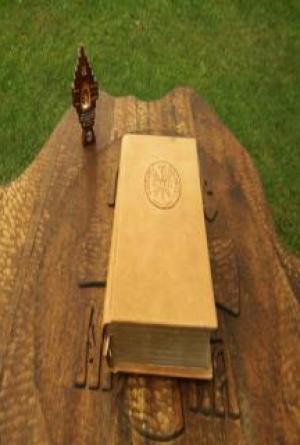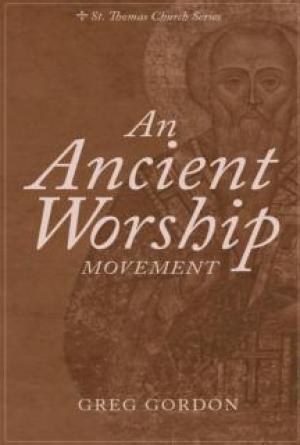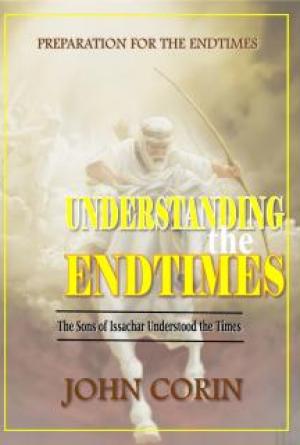
Essay Thirteen
The Church in the Wilderness
One of the greatest stumbling blocks to
a faith building understanding of the scriptures is the teaching that God
abandoned Israel as his “chosen generation, royal priesthood, holy
nation, and peculiar people; who were to shew forth the praises of him who
called them out of darkness into his marvelous light,” and in their
place he built an organization called the church, whose membership is
almost exclusively of non-Israel peoples.
Furthermore, we are taught that this revelation of a Gentile church was
first revealed to the apostle Paul, and therefore we must take the promises
made to the fathers with a grain of salt, as the prophets did not have light on
the
New Testament Church.
If God abandoned Israel because
of their sin and rebellion, what is to prevent him from doing the same thing
with the church? If this is God’s modus
operandi, could he not cast away the church in the kingdom age and appoint a
company of angels to take over the ministry of reconciliation?
For I am the
Lord - I Change Not
What an indecisive, unpredictable God
this unscriptural teaching portrays. In
Malachi 3:6 we read, “For I am the Lord, I change not; therefore
ye sons of Jacob are not consumed.” The
apostle Paul asked, “Hath God cast away his people?
God forbid. God Hath not cast
away his people which he foreknew.” (Romans
11:1-2) “For whom he did foreknow, he did
also predestinate to be conformed to the image of his Son, that he might be the
firstborn among many brethren. Moreover
whom he did predestinate, them he also called: and whom he called, them he also
justified: and whom he justified, them he also glorified. What shall we then say to these things? If God be for us, who can be against
us?” (Romans 8:29-31)
The Church fulfills God’s New Covenant Promises to Israel
God did not abandon Israel for the
Church, but rather the new covenant church was God’s means of fulfilling his
promises to Israel. When Peter brought the inaugural address to
the new covenant church in Acts 2:14-18, the very first thing he did was to
identify the Christian Church as being the fulfillment of God’s promises to the
Isaac Sons. “But Peter, standing up with the
eleven, lifted up his voice, and said unto them, Ye men of Judea, and all ye
that dwell at Jerusalem, be this known unto you, and hearken to my words: For
these are not drunken, as ye suppose, seeing it is but the third hour of the
day. But this is that which was spoken
by the prophet Joel; And it shall come to pass in the last days, saith God, I
will pour out my Spirit upon all flesh: and your sons and daughters shall
prophesy, and your young men shall see visions, and your old men shall dream
dreams: And on my servants and on my handmaidens I will pour out in those days
of my Spirit, and they shall prophesy:”
Time and again in the old scriptures we
read of God’s promise of the outpouring of his Spirit on Israel’s
seed. “Yet now hear, O Jacob my
servant; and Israel, whom I have chosen: Thus saith the Lord that made thee,
and formed thee from the womb, which will help thee; Fear not, O Jacob, my
servant; and thou Jesurun, whom I have chosen.
For I will pour water upon him that is thirsty, and floods upon the dry
ground: I will pour my spirit upon thy seed, and my blessing upon thine
offspring: And they shall spring up as
among the grass, as willows by the water courses.” (Isaiah 44:1-4) Similar promises are found in Isaiah 59:21
and Ezekiel 36:26-27. Where then did we
get the idea that God first revealed to Paul the mystery of the Church, which
is generally portrayed as a Gentile Church?
The Mystery
Hid in God from the Beginning of the World
The mystery which Paul said in Ephesians
3:5, “which
in other ages was not made known unto the sons of men”, was not the
establishment of a new organization called the Church, for in Ephesians 3:10 we
read that this mystery was to be made known by the Church. Nor was this mystery simply the revelation
that strangers to the commonwealth
of Israel could be “fellowheirs,
and of the same body, and partakers of his promise in Christ by the Gospel.” (Ephesians
3:6)
For the old scriptures plainly
teach that the stranger could enter into the congregation of Israel, and
have fellowship with God. In Isaiah
56:6-7 we read, “Also the sons of the stranger, that join themselves to the Lord, to
serve him, and to love the name of the Lord, to be his servants, every one that
keepeth the Sabbath from polluting it, and taketh hold of my covenant: Even
them will I bring to my holy mountain, and make them joyful in my house of
prayer: their burnt offerings and their sacrifices shall be accepted upon my
altar; for mine house shall be called an house of prayer for all people.”
That He Might
Gather All Things in Christ
What then is this mystery, “which
in other ages was not made known unto the sons of men, .
. . which from the beginning of the
world hath been hid in God?” (Ephesians
3:5&9) In Ephesians 3:3 Paul
declares, “How that by revelation he made known unto me the mystery; (as I wrote
afore in few words, Whereby, when ye read, ye may understand my knowledge in
the mystery of Christ).” Let’s look at Ephesians 1:9-10 for
what Paul wrote afore in few words to the Ephesians. “Having made known unto us the mystery of
his will, according to his good pleasure which he hath purposed in himself:
That in the dispensation of the fullness of times he might gather together in
one all things in Christ, both which are in heaven, and which are on earth;
even in him:” The mystery,
which in other ages was not made known unto the sons of men, was the
reconciliation of all mankind in Christ.
The reconciliation of
all men to Christ was the central theme of Paul’s preaching, “For
as in Adam all die, even so in Christ shall all be made alive.” (I Corinthians 15:22). And God’s Church, the Israel of God, were to
be the ministers of this reconciliation message. “But ye shall be named the Priests of the
Lord: men shall call you the Ministers of our God.” (Isaiah 61:6)
The Church or
Ekklesia means ‘Called Out’
The fact that in the Bible the word church (Greek word ekklesia) occurs
only in the New Testament has led many to believe that the Church is an
entirely new organization founded after Christ’s resurrection, of which nothing
was known in Old Testament times. The
Greek word, ekklesia, which was translated in the King James Bible as church means called out. In Isaiah 48:12
we read,“Hearken unto me, O Jacob and Israel my called.”
The word, ekklesia, appears 115 times
in the original Greek rendering of the New Testament. It is translated as assembly three times and
church 112 times. It is only mentioned
three times in the four gospels. It is
first mentioned in Matthews 16:16-18, “And Simon Peter answered and said, Thou art
the Christ, Son of the living God. And
Jesus answered and said unto him, Blessed art thou, Simon Barjona; for flesh
and blood hath not revealed it unto thee, but my father which is in
heaven. And I say also unto thee, That
thou art Peter, and upon this rock I will build my church; and the gates of hell shall not prevail against
it.”
Christ Refers
to the Scribes and Pharisees as the Church
In Matthew 18:15&17, Christ instructed
his disciples on what to do, “If thy brother shall trespass against thee
. .
. And if he shall neglect to hear them, tell it unto the church: but if he neglect to hear the church, let him be unto thee as an heathen man and a
publican.” In this instance, Christ makes it clear that the
church was already in existence and was well known to his disciples. He was not directing them to some
non-existent assembly, but was in fact directing them to the rulers of the
Jews, as he says in Matthew 23:2-3. “The scribes
and Pharisees sit in Moses seat: All therefore whatsoever they bid you observe,
that observe and do; but do not ye after their works: for they say, and do
not.”
It is generally acknowledged that Christ
spoke in Aramaic, the dialect of Hebrew spoken by the Jews in Palestine at that time. As a consequence, Christ would not have used
the Greek word, ekklesia, in
reference to the church. Since Aramaic
embodied Biblical Hebrew terms for most religious ideas and usages, we must ask
the question; What Hebrew word did Christ use, which Matthew translated in the
Greek as ekklesia?
Hebrew Word
Qahal = Greek Word Ekklesia = Church
The Hebrew word, qahal, most closely approximates the Greek word, ekklesia. As the Greek word, ekklesia, means called out, the
Hebrew word, qahal, means called together. Qahal appears 123 times in the Old Testament. It is translated as assembly 17 times, company 17
times, congregation 86 times, and multitude 3 times.
Christ was in
the Church in the Wilderness
In
Acts 7:38, we find the Israel
congregation (Qahal) is referred to as the Church. “This
is that Moses, which said unto the children of Israel, A prophet shall the Lord
your God raise up unto you of your brethren, like unto me; him shall ye
hear. This is he, that was in the Church in the Wilderness with the angel which spake to him in the mount Sina,
and with our fathers: who received the lively oracles to give unto us.” In
this verse, Stephen unmistakably identifies Israel in the wilderness as the
Church. Furthermore, he makes it clear
that Christ was with his Church in the wilderness just as he is with the New Testament
Church, which Paul identifies in Galatians 6:16 as the Israel (or Church) of
God.
Stephen’s declaration, identifying the
Israel Congregation as the Church, is by no means an isolated passage which we
can attribute to an overzealous Israelite or an ambiguous translation. The apostle Paul makes the same
identification in Hebrews 2:12, “I will declare thy name unto my brethren,
in the midst of the Church will I sing praise unto thee.” Paul is quoting Psalm 22:22 verbatim,
only substituting church (ekklesia) for congregation (qahal). Either these words are equivalent, or Paul is
making a shambles of the scriptures.
Churches of
the Saints = Congregation of the Saints
In I Corinthians 14:33 Paul declares, “For God is not the author of
confusion, but of peace, as in all churches of the saints.” In Psalm 149:1 we read, “Sing
unto the Lord a new song, and his praise in the congregation of the
saints. Let Israel rejoice in him that made
him.” Now if the churches of the saints, and the congregation of the saints, are two
different organizations, then somebody is certainly trying to confuse us, and
we are assured that God is not the author of such confusion.
House of God =
Church of God
In I Timothy 3:15, Paul identifies the house of God as the church of God; “that
thou mayest know how thou oughtest to behave thyself in the house of God, which
is the church of the Living God.”
The Israel
congregation (Qahal) is the only organization identified in scriptures as the house of God. In Psalm 135:1-4 we read, “Praise
ye the Lord. Praise ye the name of the
Lord; praise him, O ye servants of the Lord.
Ye that stand in the house of the Lord, in the courts of the house of
our God. Praise the Lord; for the Lord
is good: sing praises unto his name; for it is pleasant. For the Lord hath chosen Jacob unto himself,
and Israel
for his peculiar treasure.”
Flock of God =
Church of God
In Acts 20:28, Paul identifies the flock as the church of God.
“Take heed therefore unto yourselves, and to all the flock, over which
the Holy Ghost hath made you overseers, to feed the church of God,
which he hath purchased with his own blood.”
In Ezekiel 34:14-15, God unfolds the beautiful relationship
between Christ, the Good Shepherd, and Israel his flock. “I will feed them in a good pasture, and
upon the high mountains of Israel
shall their fold be: there shall they lie in a good fold, and in a fat pasture
shall they feed upon the mountains of Israel. I will feed my flock (Church of God) and I will cause them to lie
down, saith the Lord God.”
If the apostle Paul is using terms in
the old testament which are peculiar to Israel, such as; congregation of the saints, house of God, flock, and is applying them to a new
organization called the Church, then the Bible is a book which
can be interpreted anyway we would like.
If we cannot have confidence in the Biblical definition of terms, how
could we ever hope to interpret the symbolism and prophesies of the book of
Revelation? Only the Bible can be used
to interpret the Bible. II Peter 1:20 admonishes us that, “no
scripture came about by the prophet’s own interpretation.” It must be interpreted in context with all
scripture as revealed by the spirit of God.
Christ Loved
the Church and gave Himself for it
In the fifth chapter of Ephesians, Paul
presents a simile which has led many Bible students to believe that the church,
rather than Israel,
is the wife of Christ. In Ephesians 5:23-25
we read, “For the husband is the head of the wife, even as Christ is the head of
the church: and he is the savior of the body.
Therefore as the church is subject unto Christ, so let the wives be to
their own husbands in every thing.
Husbands, love your wives, even as Christ also loved the church, and
gave himself for it.”
What scriptural basis does Paul have for
likening the church to the wife of Christ?
Anyone familiar with scripture knows that only Israel could be
called the wife of Christ. Isaiah 54:5
declares, “For thy Maker is thine husband; and the Lord of hosts is his name; and
thy Redeemer the Holy One of Israel.” In Jeremiah 3:14 we read, “Turn, O backsliding children, saith
the Lord; for I am married unto you.”
Was Christ unfaithful
to His Wife Israel?
Is it possible that Paul is unfamiliar
with the relationship that God established with his people Israel? Or, knowing this relationship, is it possible
that Paul would portray Christ as an unfaithful husband?
In Ephesians 5:26-27 Paul continues, “That
he might sanctify and cleanse it with the washing of water by the word, That he
might present it to himself a glorious church, not having spot, or wrinkle, or
any such thing; but that it should be holy and without blemish.”
Paul uses the same language to describe
the Church that John uses to describe Israel in Revelation 19:7-8, and
21:2. “Let us be glad and rejoice, and
give honour to him: for the marriage of the lamb is come, and his wife hath
made herself ready. And to her was
granted that she should be arrayed in fine linen, clean and white: for the fine
linen is the righteousness of saints .
. . And I John saw the holy city,
new Jerusalem, coming down from God out of heaven prepared as a bride adorned
for her husband.”
The Church and
Israel
Become One
Who then is the wife of Christ, the
Church, or Israel? Paul answers this question in Ephesians 5:31. “For this cause shall a man leave his father
and mother, and shall be joined unto his wife, and they two shall be one flesh. This is a great mystery; but I speak
concerning Christ and the church.”
In this simile Paul declares he is trying to reveal to us the great mystery
of the unity of his body, the Church, and his wife, Israel. When Israel has been cleansed through
the provision of the new covenant, then she will be able to function as his
perfected body, or his Ekklesia.
If the children of Israel form the
nucleus of God’s church, then why are they not all professing and practicing
Christians? It should be obvious that
the members of God’s church are in varying stages of development. The lessons which God teaches us in the flesh
are as much a part of our training as was Israel’s trek in the wilderness; “that
he might make thee know that man doth not live by bread only, but by every word
that proceedeth out of the mouth of the Lord doth man live.” (Deuteronomy 8:3)
When it
Pleased God to Reveal his Son to Paul
Many Christians are going to have a
difficult time accepting into fellowship those who have vigorously opposed God
and his church while they walked after the flesh. Nevertheless, when God gives them a new heart
as he has surely promised, he is able to do great and mighty things with the
basest of men. Who would have expected
Paul to be used of God in such an extraordinary way after persecuting the
church so viciously? Furthermore, the
church was very apprehensive about taking Paul into their fellowship. Nevertheless, the scriptures teach that Paul
was a member of God’s Church (i.e. called out), even while in apparent
opposition to that church. In Galatians 1:15 we read, ”But when it pleased God, who
separated me from my mother’s womb, and called me by his grace, To reveal his
Son in me, that I might preach him among the heathen.” When it pleased God, he stopped
Paul in his tracks, gave him a new heart, and caused him to walk in his
ways. I believe God works in this way so
that he might destroy all confidence in our own merit, and cause us to rest
solely in his grace. “For
by grace are ye saved through faith; and that not of yourselves: it is the gift
of God; Not of works, lest any man should boast.” (Ephesians 2:8)
God’s Gifts
and his Call are Irrevocable








